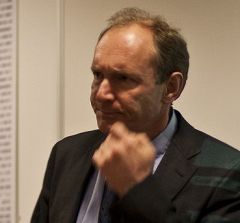- Director, World Wide Web Consortium
In the 1980s, scientists at CERN were asking themselves how massive, complex, collaborative projects -- like the fledgling LHC -- could be orchestrated and tracked. Tim Berners-Lee, then a contractor, answered by inventing the World Wide Web. This... More
In the 1980s, scientists at CERN were asking themselves how massive, complex, collaborative projects -- like the fledgling LHC -- could be orchestrated and tracked. Tim Berners-Lee, then a contractor, answered by inventing the World Wide Web. This global system of hypertext documents, linked through the Internet, brought about a massive cultural shift ushered in by the new tech and content it made possible: AOL, eBay, Wikipedia, TED.com...
Berners-Lee is now director of the World Wide Web Consortium (W3C), which maintains standards for the Web and continues to refine its design. Recently he has envisioned a "Semantic Web" -- an evolved version of the same system that recognizes the meaning of the information it carries. He is also a senior researcher at MIT's Computer Science and AI Lab.
[Photo from Wikipedia.]
Tim Berners-Lee's Presentations
| TED2010 | February 2010 |
Watch videoThe year open data went worldwide: At TED University in 2010, Berners-Lee shows a few of the interesting results when raw data from governments, scientists and institutions gets linked up. The year open data went worldwide: At TED University in 2010, Berners-Lee shows a few of the interesting results when raw data from governments, scientists and institutions gets linked up. |
| TED2009 | February 2009 |
Watch videoThe next Web of open, linked data: 20 years ago, Tim Berners-Lee invented the World Wide Web. For his next project, he's building a web for open, linked data that could do for numbers what the Web did for words, pictures, video: unlock our data and reframe the way we use it together. The next Web of open, linked data: 20 years ago, Tim Berners-Lee invented the World Wide Web. For his next project, he's building a web for open, linked data that could do for numbers what the Web did for words, pictures, video: unlock our data and reframe the way we use it together. |

Share